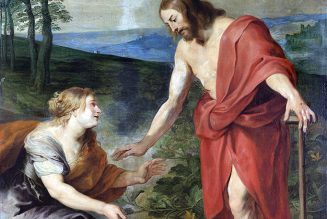Virtue in Obedience
According to likely tradition, St. Ignatius the bishop of Antioch learned about our Faith from St. John the Apostle. Around the year 110 A.D., St. Ignatius was brought by Roman guards from Syria to Rome for his martyrdom. On this long journey, he wrote seven famous letters which provide insight into the teachings and beliefs of the Early Church. In his letter to the Christians in Smyrna, he wrote:
“See that you all follow the bishop even as Jesus Christ does the Father, and the presbytery [priests] as you would the apostles; and reverence the deacons as being the institution of God. Let no man do anything connected with the Church without the bishop. Let that be deemed a proper Eucharist which is administered either by the bishop or by one to whom he has entrusted it. Wherever the bishop shall appear, there let the multitude of the people also be; even as wherever Jesus Christ is, there is the Catholic Church.”
 Catholic priests at ordination promise obedience to their bishop and his successors, but religious submission to one’s bishop-shepherd (in things which are not sinful) is Christ’s will for all the faithful. “Whoever hears you, hears me,” Jesus said, and “whatever you shall bind on earth shall be bound in Heaven, and whatever you shall loose on earth shall be loosed in Heaven.” “Let us be careful, then, not to set ourselves in opposition to the bishop,” St. Ignatius wrote to the Ephesians, “in order that we may be subject to God.” Before he lost the kingdom, King Saul was told by the Prophet Samuel, “Obedience is better than sacrifice; to listen, better than the fat of rams.” The Lord delighted in obedience to his will more than in burnt offerings and animal sacrifices because holy obedience is a sacrifice of one’s own self.
Catholic priests at ordination promise obedience to their bishop and his successors, but religious submission to one’s bishop-shepherd (in things which are not sinful) is Christ’s will for all the faithful. “Whoever hears you, hears me,” Jesus said, and “whatever you shall bind on earth shall be bound in Heaven, and whatever you shall loose on earth shall be loosed in Heaven.” “Let us be careful, then, not to set ourselves in opposition to the bishop,” St. Ignatius wrote to the Ephesians, “in order that we may be subject to God.” Before he lost the kingdom, King Saul was told by the Prophet Samuel, “Obedience is better than sacrifice; to listen, better than the fat of rams.” The Lord delighted in obedience to his will more than in burnt offerings and animal sacrifices because holy obedience is a sacrifice of one’s own self.
Even the yoke of Christ remains a yoke. It’s natural to feel frustration at our gradual return to normal, towards the careful procedures our bishop has promulgated throughout our diocese to help protect against a still-deadly pandemic. These policies may prove overly cautious in retrospect—and I hope that is the case rather than seeing our safeguards prove tragically inadequate—but the will of Christ for you and I is to obey our God-ordained successor to the apostles. Blessed is that servant whom the Lord on his arrival finds doing so.









